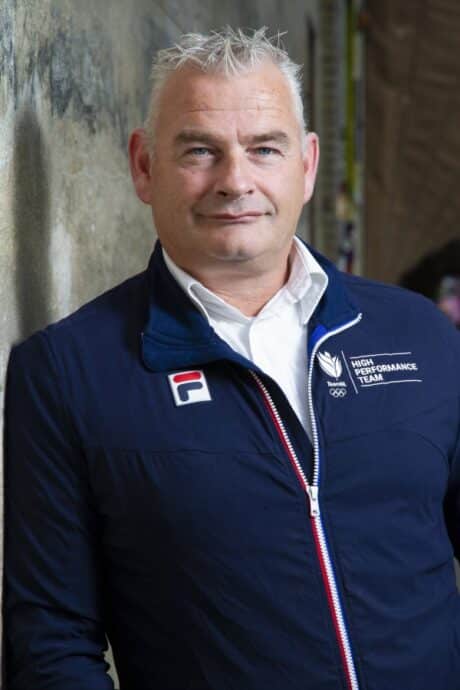About
Francesco Wessels
Francesco Wessels is a leading expert in resilience, leadership, and their impact on performance. He brings behaviour to the forefront of discussion, exploring its connection to achieving goals, particularly in high-pressure situations.
As Team Leader of the ‘High Performance Team’ at the NOC*NSF sports federation, Francesco has guided the national coaches of TeamNL. Over the past five Olympic Games, he has stood behind TeamNL coaches, supporting their development in leadership, group dynamics, and mental conditioning. His work centres on understanding how a coach’s behaviour directly influences the performance of elite athletes and teams.
With over 20 years of service in the defence sector, Francesco has honed his expertise in performing under extreme conditions. His extensive deployment experience in Afghanistan, Bosnia, and Macedonia, combined with his theoretical knowledge, enables him to bridge the gap between theory and practice effectively. Francesco has shared his insights through various books and publications.
Francesco also collaborates with organisations tackling complex change processes, focusing on the critical evaluation of culture and leadership. His specialisation in mental resilience and coaching allows him to deliver knowledge on building mentally robust leaders and teams in an inspiring and practical manner.
Francesco’s presentations are dynamic, engaging, and laced with humour, yet they are also candid and thought-provoking. His blend of military and Olympic anecdotes captivates audiences and leaves a lasting impression.
1. Leadership
At its core, leadership is simple: your role is to ensure that others take action. In recent years, there has been a tendency to embellish the concept by attaching various qualifiers to the term ‘leadership’—vital leadership, inspiring leadership, coaching leadership, and so on. However, with these “prefixes,” we risk losing sight of the essence of leadership by focusing too much on the label rather than the substance.
Leadership is not something you do “on the side.” It requires time, effort, and, most importantly, initiative, preparation, and efficient behaviour.
2. Mental Resilience
It’s always fascinating to ask others what mental resilience means to them. Somehow, everyone seems to have their own interpretation or definition, often shaped by their personal frame of reference. We all understand that mental resilience plays a crucial role in everything we do. However, when asked, “What can you do to strengthen mental resilience?” most people raise an eyebrow, let alone when a manager is asked, “What do you do to ensure your employees are resilient at critical moments?”
Together with Roos Delahaij, we distilled this concept into four key principles and training methods, detailed in our book “Wat Doe Je Nu” (“What Are You Doing Now?”). The book explores specific training approaches and the conversations that support them.
In my talks, I delve into this mindset using anecdotes and experiences from intense combat situations and Olympic triumphs. These examples illustrate that mental resilience isn’t an abstract or difficult concept but rather a process that can be deliberately shaped and developed.
3. Coaching
Coaching is one of many forms of guidance. It encompasses a wide range of conversational techniques, each with its own characteristics and objectives—confrontational discussions, evaluations, reflective dialogues, and so on. Coaching, however, is a specific conversational method aimed at helping others identify their challenges, address them, and ultimately achieve the desired outcomes. Integrity and equality form the bedrock of effective coaching.
While being skilled in conducting a proper coaching conversation is essential, I place great emphasis on its foundational principles—integrity and equality. My coaching style is best described as “comfortably confrontational,” ensuring a balance between creating a safe space and challenging individuals to grow.
4. Behavioural Development
Our experiences, backgrounds, and traits play a significant role in shaping our behaviour. In everyday life, we often respond to stimuli automatically, exhibiting unconscious patterns of behaviour. Developing behaviour is no different from learning a skill or acquiring knowledge.
By working with developmental goals, past behaviours can be identified and addressed. The challenge lies in creating experiences and building a framework that fosters desired behaviours, even in unanticipated situations. Knowledge and skills are meaningless without the will, courage, and determination to apply them. I see cultivating these aspects as essential for ensuring that individuals instinctively exhibit the right behaviour, even under pressure or in challenging circumstances.
5. Performing Under Pressure
Pressure is a matter of perception: “the expectation that one cannot meet the demands of the situation and the consequences of that belief.” Yet, without pressure, there is no peak performance. A certain level of tension is necessary to bring out our sharpest and best efforts—a natural and logical process.
However, people respond differently to pressure; some thrive under it, while others struggle. For leaders, performing under pressure is often an overlooked topic. The impact of pressure on decision-making and behaviour frequently goes unexamined. Yet, success under pressure is unparalleled, highlighting the importance of recognising and managing it effectively.
6. Leading Under Extreme Circumstances
Imagine making a decision in the next minute that could have far-reaching consequences. You know that even the tone of your voice and how you deliver your message will influence how others act.
Are you fully in control of yourself? Have you considered all possibilities? Are you utilising all your knowledge and skills effectively? And what will you do when something happens that you didn’t anticipate or thought would never occur?
Leadership under extreme circumstances demands not only technical proficiency but also emotional resilience, ethical judgement, and the ability to remain composed amidst unpredictability.
7. Leadership, Ethics, and Values
Leadership extends beyond decision-making; it encompasses a deep understanding of ethics, values, and norms. These principles guide leaders in navigating complex scenarios, ensuring that their actions inspire trust, respect, and a shared sense of purpose.


 © Speakers Academy - Walter Kallenbach
© Speakers Academy - Walter Kallenbach



